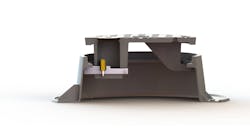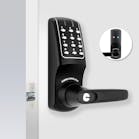The smartphone generally is accepted as being a high-security device. About the only way it can be cracked, assuming you don’t leave it unlocked somewhere, is if you use a kindergarten-level password, such as “password.”
That’s one of the reasons why electronic access control increasingly is going mobile. Using a smartphone is more convenient than a card or fob, and the credentials supplied generally can’t be accessed, except by the right person.
With that in mind, why would anyone want a mechanical, or electromechanical, high-security keyway system these days? The answer is part of the solution’s name — security.
“We can automate the door so you can open it with a cellphone, but there’s always going to be a mechanical lock in there,” says Larry Schwalb, security engineer at Houdini Lock & Safe in Philadelphia. But, “what do you do when that fails? We’re always going to need some type of bypass.”
In other words, a mechanical key that can unlock a lock if batteries go bad or power goes out is an important piece to the puzzle. Schwalb says a standard solution at his business is an electronic lock that has a high-security keyway as the mechanical override.
High-security keyways carry a higher price, so most people opt for the standard version. But Schwalb says there’s a simple sell to counteract price motivation — again, security.
Basic mechanical keyways by Kwikset and Schlage have become so common that “1 in 40” people carry a key that probably could work multiple locks. More significant is whether customers give out copies of mechanical keys.
“If the customer says, ‘Yes,’ the next question we ask is, ‘Do you mind if they make copies without your permission?’” Schwalb says. “Most people say, ‘Yeah, I mind,’ but they can’t do anything about it” if they use a standard keyway.
Trust plays a role in such an exchange, of course, but someone else might gain access to those keys, and it’s now possible to have duplicates made from an image of a key without the key being present. That threat is eliminated by a high-security keyway that has patented key control where only certain locksmiths or even only the manufacturer can make a duplicate. “If you don’t have keys that have key control, you have no security,” Schwalb says. “You have the thought that you have security.”
Surprisingly, Schwalb aims his high-security pitch at residential customers in addition to the typical markets. (See “A High-Security Primer,” page 10.) That’s because commercial or industrial customers don’t require much convincing.
“They get it,” he says, meaning they understand the value of a high-security system, with its key control as well as bump and pick resistance. A layperson who is unfamiliar with high security, however, might not. “Everyone deserves the best. Everyone deserves a high-security lock.”





